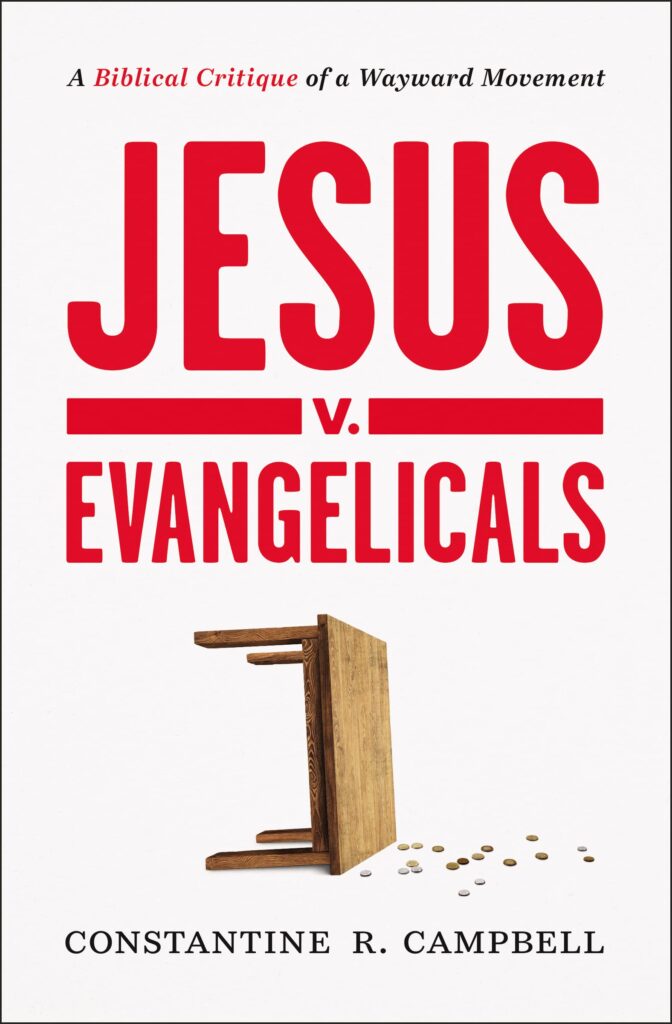Con Campbell’s Jesus v. Evangelicals—a review


This is a fascinating book by my friend Con Campbell, an Aussie New Testament scholar (presently Associate Research Director of the Sydney College of Divinity)—and very fine saxophonist—who worked in the US for several years. Full disclosure: he kindly asked his publisher to send me a copy, and I’ve read it with interest and appreciation.
Con sets out to offer a critique of the American evangelical scene from outside, although my view (as an outsider too—I’m a Brit) is that his observations appear pretty accurate. It will be intriguing to see the responses from Americans, both those who consider themselves evangelical and those who don’t.
But what do we mean by ‘evangelical’? Con tackles this question head on in his Introduction, and observes three kinds of people who call themselves by this name: (i) theological evangelicals, who have evangelical theological convictions (Scripture as God’s authoritative word, understood to teach Jesus as God’s son who died to reconcile sinful people to God and give them eternal life); (ii) cultural evangelicals, who adopt a lifestyle, practice of church and worship informed by theological evangelicalism, without necessarily holding evangelical theological views; (iii) political evangelicals, who have (often party) political convictions, and may not fit either of the other two types. Con identifies himself as the first sort of evangelical (and I think that would be true of most evangelicals in the UK, where I live, and many other parts of the world), and this book aims to use Scripture to assess and critique what goes by the evangelical name in the US today.
His diagnosis is that other things, notably particular cultural, political or social commitments, are in fact given a higher place than Scripture in the faith and practice of those who claim the name ‘evangelical’. This is hardly new (I recall hearing the late great John Stott calling on evangelicals to allow the Bible to critique evangelical traditions), but the careful analysis of different ways this issue appears in American evangelicalism is, to my knowledge, the most careful and thorough I have seen.
Each chapter has a similar structure: the issue is identified and outlined, with good examples and evidence that it’s a real issue; there’s some analysis and reflection on the effects of the beliefs and/or behaviour involved; and then Con offers a critique rooted in Scripture, and particularly in the teaching and ministry of Jesus.
The issues he tackles are:
- unquestioning loyalty to America as God’s country which distorts the spiritual nature of the Christian faith
- a division of the world into ‘us’ and ‘them’ (including within the Christian community at large), insiders and outsiders, including areas of ethnicity, sexuality
- judgementalism toward others over a fairly narrow band of unacceptable behaviours, including divorce, homosexual practice, gender dysphoria, abortion, and (in many circles) voting Democrat
- tribalism over particular areas within evangelical theology and practice—classically eschatology in the US, but also Calvinism and Arminianism, the relationship of evangelism and social transformation, or which political party one supports
- having ‘acceptable’ sins, such as arrogance, pride, manipulation, greed, judgmentalism and party spirit, which are tolerated and not matters of discipline (by contrast with the unacceptable sins noted above)
- marriage, divorce, and remarriage, where Con himself had his fingers badly burned after his first marriage ended, in finding himself asked what the biblical basis for his divorce was before anything else (!), and being shunned by fellow-Christians—and these issues are particularly acute for those (like Con) in Christian leadership or teaching in a theological college or seminary
- megachurches, which promote a consumer view of belonging to a church, and a spectator view of church life—and these include multi-site churches, and have damaging effects on pastors of megachurches who believe their own publicity
- the ‘lunatic fringe’, of those who preach a prosperity or health and wealth gospel—he considers Kenneth Copeland, Joel Osteen and Paula White (and in the case of the latter, notices that she and John MacArthur—a million miles from her theologically—found themselves both advocating for Donald Trump’s election as US President)
A final chapter points those who claim the name ‘evangelical’ back to Jesus, and the way that his teaching and ministry deal with the fault lines he identifies. He leaves open whether the label ‘evangelical’ should simply be dropped as now being unhelpful or so misunderstood that it’s meaningless to most.
I have read this book with appreciation. In places I found myself saying, ‘Yes, but…’ For example, his description of Christianity as spiritual rather than political (chapter 1) could lead to political quietism (and there are evangelicals who take this view)—and, in fairness, Con does not advocate that; he’s critiquing the identification of Christianity with a particular set of political positions. His critique of megachurches (chapter 7) is, I think, somewhat one-sided, for many of these churches advocate and practise small groups as part of their discipling of members in order to avoid the spectator mentality which Con (rightly) criticises. But those are small qualifications to an overall argument that needs to be read, heard and responded to with heartfelt repentance—and not just in the USA.
What do you think, folks? I’d be interested to hear responses, particularly from those in the US who have read the book.


